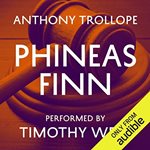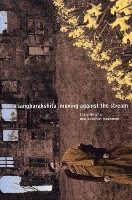Tales of the City
by Armistead Maupin
"San Francisco, 1976. A naïve young secretary, fresh out of Cleveland, tumbles headlong into a brave new world of laundromat Lotharios, pot-growing landladies, cut throat debutantes, and Jockey Shorts dance contests. The saga that ensues is manic, romantic, tawdry, touching, and outrageous."I remember liking this book a whole lot more when I first read it than this time - I'm finding books about hooking up with partners and relationships a little hard going at the moment. It's not a bad book, but back then (in the late 1980's?) I think it was very new to me, unlike anything I'd read before. Now I'm older and more world-weary.
Phineas Finn
by Anthony Trollope
narrated by Timothy West
"Phineas Finn is a talented but naive doctor's son from Ireland with Parliamentary aspirations. He must make numerous practical and ethical choices regarding his career, his political beliefs, and his romantic life, in hopes of emerging with his character, reputation, and prospects intact."It's interesting how much I thought I remembered from the BBC production of The Pallisers starring Susan Hampshire as Glencora and Philip Latham as Plantagenet. In particular, the characters of Phineas Finn and Madame Max Goesler stood out - I thought I remembered her dark dresses in green and black, and her facial appearance and accent. But I can't find any trace of her on IMDb so can only conclude that I must be thinking of someone else. Whatever, I still love Trollope and very much appreciated that he allowed his characters to remain honourable and not let me down.
Doomsday Book
by Connie Willis
"For Kivrin, preparing an on-site study of one of the deadliest eras in humanity's history was as simple as receiving inoculations against the diseases of the fourteenth century and inventing an alibi for a woman traveling alone. But a crisis strangely linking past and future strands Kivrin in a bygone age as her fellows try desperately to rescue her."One of my top five books that I return to occasionally. I found it after reading To Say Nothing of the Dog - it's by the same author but I like it more, not that it's a cheerful story or anything, but the settings of Oxford in the future and Oxfordshire in the past are brought fully to life and I can imagine living among the people, especially in the past. The sections set in the future have a new resonance, because a flu epidemic has broken out there - a new strain not yet sequenced, and so much of what she wrote about in 1992 came to pass in 2020 - PPE and face masks, mortality, quarantine and restrictions, and, surprisingly, toilet paper. How did she know that a shortage of toilet paper would be one of the hallmarks of the UK Coronavirus pandemic? And the final few chapters are really wonderful.
Moving Against the Stream: The Birth of a New Buddhist Movement
by Sangharakshita
"After twenty years in the subcontinent - travelling and lecturing, writing, working among the most deprived, and extending and deepening his knowledge of the Dharma - Sangharakshita has been invited by leading British Buddhists to help resolve tensions in the British Buddhist scene."
The fourth memoir by the founder of the Triratna Buddhist Community, and written much later than the first three, after a gap of about 30 years, so he struggles to recall the events with immediacy and relies quite a lot on his contemporaneous journals. I got the impression that he felt the need to record two things: one, the friendship he enjoyed with one particular man who took his life at the end of the events described in the book, and two, why he broke away from the two English Buddhist Societies that existed at the time to found a new movement. Reading the memoirs has been illuminating about the author as a man who was incredibly well read in humanities, arts and philosophy but completely lacking in any scientific knowledge. He was intensely spiritual, believed in all sorts of supernatural phenomena, saw visions, and took his dreams very seriously.
At the same time as reading this book during my solitary retreat I was also listening to the voice of the author delivering a series of lectures which form the basis of the material we're about to study in one of my Buddhist groups, and also reading the book which came out of the lectures including additional material and clarification on some points. So I was really immersed in the man. There's no doubt of his sincerity and his knowledge of Eastern Buddhism, but when he lapses into speaking as himself he reveals himself to be a man of the time, with views that clash badly with today's society - about the place of women, for example. He was also the subject of a scandal when it was reported that some people who looked to him as a teacher complained that he had been a sexual predator. No charges were brought and the Triratna Buddhist Order has taken steps to put rigorous safeguarding processes in place to prevent any recurrence of this type of activity.
Shortly after he died, which was only in 2018, I went to a talk at the Birmingham Buddhist Centre where various people were asked to speak of their connection with him. I was slightly taken aback when one of the speakers said that in a way he was glad that Sangharakshita was now dead, because it allowed his far-sighted vision of Buddhism in the West and his extraordinary skill in building a sustainable movement and community to shine through and not be sullied any longer by the man himself. I now think I understand what he meant, and I concur.




No comments:
Post a Comment